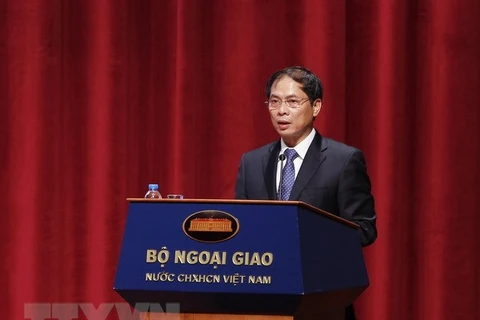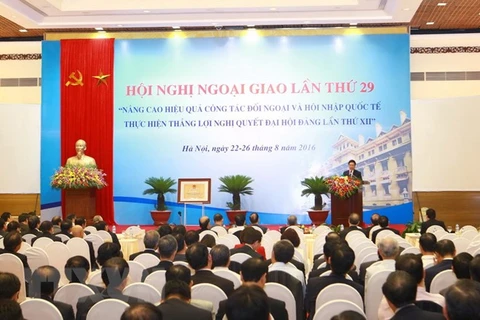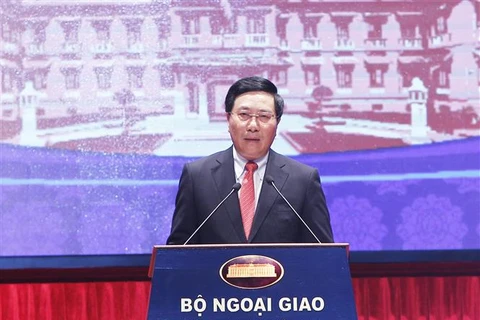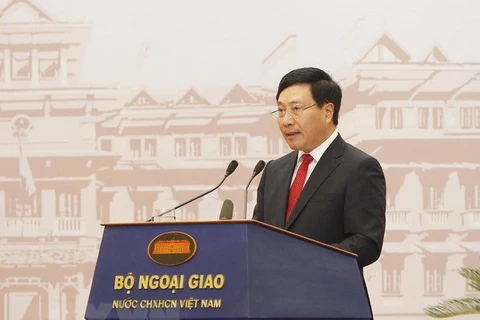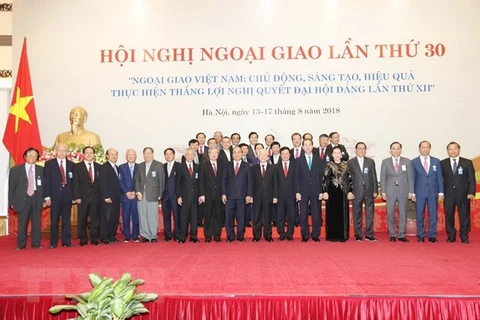Hanoi (VNA) – The diplomatic sector has efficiently served the national revolutionary cause and made worthy contribution to the country’s strong rise from the ruin of war to become a symbol of peace, stability, unity and harmony, renovation and development, according to the country’s top diplomat Pham Binh Minh.
Deputy Prime Minister and Foreign Minister Pham Binh Minh has reviewed the work and achievements of the diplomatic sector over the past years in the context of a world full of constant changes, and outlined the main tasks for the sector in the time ahead in an article on the occasion of the 30th Diplomatic Conference and 19th External Affair Conference from August 12-17 in Hanoi.
A world full of changes
The Deputy PM underlined that over the past two years, the international and regional situation is witnessing rapid, complex and unforeseeable changes, posing many challenges to the country’s strategic environment and creating direct impacts on the country’s security and development interests.
He noted that despite the recovery of the global economy, global financial risks, protectionism and trade wars are having negative effects on economic development of the world and Vietnam.
The rise of the industrial revolution 4.0 and science-technology as an important production force also creates unprecedented challenges for Vietnam, he said, adding that the risk of lagging behind is real if the country cannot capitalize on the trend.
Meanwhile, the political–security situation in the world is full of fluctuations such as policy adjustments of countries and the rise of nationalism, which make the regional security increasingly insecure. Interest differences among G7, G20 and EU members affect the role of multi-lateral mechanisms. Complicated developments in the East Sea, especially large-scale reclamation and militarization activities are threatening peace, security and stability in the region as well as the legitimate rights and interests of many countries including Vietnam.
Consolidating and creating peaceful environment for development
Deputy PM and FM Minh affirmed that following the external relation guideline of the 12th Party Congress, the diplomatic sector has persistently upheld its principles, firmly pursued targets and exercised proactiveness and flexibility in implementing assigned tasks, thus achieving many important outcomes, contributing to protecting national sovereignty and maintaining a peaceful and stable environment for national development, integration while enhancing the country’s position.
The head of the diplomatic sector underlined that the sector has paid special attention to building institutions in the field. Over the past two years, the sector has submitted to the Party and the Government many proposals on foreign policies, including those dealing with international economic integration and promotion of multilateral external relations.
Accordingly, Vietnam has actively deepening relations with neighbouring countries, the Association of Southeast Asian Nations (ASEAN), major powers, strategic partners, comprehensive partners and traditional friendly countries. So far, Vietnam has established diplomatic relationships with 188 countries, and strategic and comprehensive partnerships with 27 partners, which include all five permanent members of the UN Security Council. The wide network of relations not only helps enhance Vietnam’s status but also provides an important foundation of and contributes directly to national defence and construction.
[Infographics: 30th Diplomatic Conference to focus on four key issues]
Deputy PM Minh stressed that through creating the foundation of political trust, the diplomatic sector performed well its role in promoting international economic integration and expanding markets for the country. Vietnam has set up free trade frameworks with nearly 60 countries, which in combination account for 59 percent of world population, 61 percent of world GDP and 68 percent of world trade, through 16 free trade agreements (FTAs), including new-generation ones such as the Comprehensive and Progressive Agreement for Trans-Pacific Partnership (CPTPP) and the EU-Vietnam Free Trade Agreement (EVFTA). Vietnam’s localities have also inked 420 international agreements since 2016 covering cooperation in all aspects.
At the same time, the country has optimized multilateral mechanisms to protect national rights and interests, while engaging in joint efforts to address common challenges facing the international community, the Deputy PM said.
According to Minh, the country has shifted from “actively participating in” to “taking initiative in contributing to and bulding multilateral institutions.” As the host of the Asia-Pacific Economic Cooperation (APEC) Year in 2017, Vietnam selected the theme and priorities for the year that suited the common concern and reconciled differences, thus helping define the orientation for a new period of development in the region in the APEC post-2020 vision. In the context of strong rise of nationalism and protectionism, APEC 2017 was able to not only maintain the impetus but also push forward linkage, connectivity and free trade in the region.
Besides, Vietnam also demonstrated its high sense of responsibility as member of ASEAN, the UN, the Asia-Europe Meeting (ASEM), the UN Security Council, the UN Economic and Social Council (ECOSOC), the UN Educational, Scientific and Cultural Organisation (UNESCO) and Mekong mechanisms, among others.
A top and regular task of the diplomatic sector is to protect national sovereignty and territorial integrity. Deputy PM and FM Minh said the sector has maintained close coordination with other ministries, agencies and local administrations while cooperating with relevant countries to build borderlines of peace, friendship, stability and cooperation for development.
In the East Sea issue, facing new and complicated developments with potential unforeseeable risks, Vietnam has persistently and firmly deployed many measures to defend national sovereignty and sovereign and jurisdiction rights over waters, continental shelf and islands in line with international law, including the 1982 UN Convention on the Law of the Sea.
The Deputy PM said Vietnam, together with the ASEAN and China, is pushing negotiations on a legally-binding and effective Code of Conduct on the East Sea. At the same time, the country is actively expanding marine cooperation with countries inside and outside the region, and holding talks to narrow differences and build trust.
Protecting the interests of Vietnamese citizens and Vietnamese nationals overseas is another task of special importance for the diplomatic sector, according to Minh. Since 2016, the sector has protected more than 16,000 citizens and more than 5,000 fishermen. Guidelines and policies on support of overseas Vietnamese have been carried out synchronously, helping consolidate the national unity bloc and optimize the resource from 4.5 million overseas Vietnamese for national development.
Cultural diplomacy has also received attention with a view to preserving the national cultural identity during international integration and enhancing the nation’s position and “soft” strength. A project on honouring President Ho Chi Minh as a hero of national liberation and an outstanding man of culture has been carried out effectively.
Furthermore, since 2016 Vietnam has had eight more heritage items recognised by UNESCO, bringing the total number of UNESCO-recognised heritage titles in the country to 38. The recognition has greatly helped promote the image and tourism of localities home to the heritage.
Deputy PM and FM Minh said the achievements recorded by the diplomatic sector have contributed to the national cause of construction and defence, but many opportunities remain untapped. Besides, international integration and scientific-technological development have brought about many challenges that require the diplomatic sector to make greater efforts, be more innovative in thinking, adopt modern approaches and pay more attention to efficiency in order to successfully implement the Party’s guidelines and resolutions. This is the main theme of the 30th Diplomatic Conference.
He said the conference will review the implementation of the Resolution of the 12th Party Congress on external affairs and map out measures to continue reaping good outcomes in the work.
The conference will also make assessment and forecast of the world and regional situation in the next 3-5 years with a vision for 10-15 years beyond with a view to identifying opportunities and challenges facing the country.
Measures and methods to improve the efficiency of the country’s integration process will be discussed, with an emphasis on multilateral diplomatic activities in the time ahead.
The Diplomatic Conference was first organized in 1957 and has since become a traditional event of the diplomatic sector.-VNA
VNA

